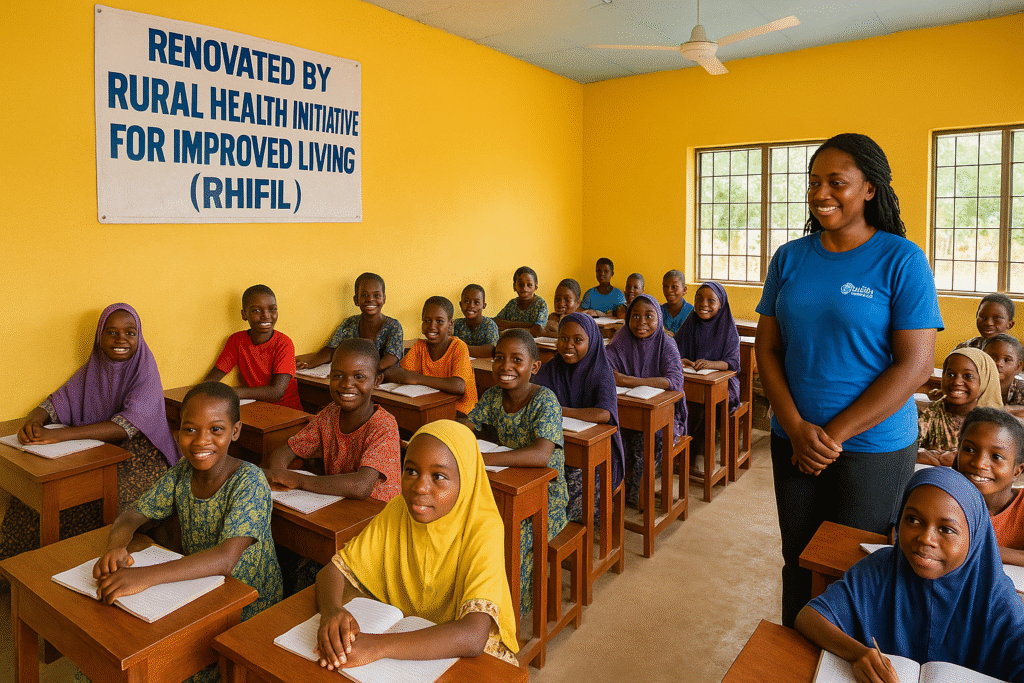Uhogua, Edo State – October 19, 2025
A non-governmental organisation, the Rural Health Initiative for Improved Living (RHIFIL), has renovated six dilapidated classrooms at the Home for the Needy (HfN) Internally Displaced Persons (IDP) Camp in Uhogua, near Benin City, Edo State — a development that has been hailed as a major boost to the education and morale of displaced children in the region.
The newly renovated classrooms, which had long suffered from leaking roofs, cracked walls, and broken furniture, now provide a safer and more conducive learning environment for over 3,000 children currently living in the camp.
RHIFIL said the renovation was part of its ongoing “Education for Resilience” project, aimed at improving access to education and psychosocial support for children affected by conflict and displacement in northern Nigeria.
A Beacon of Hope Amid Displacement
Speaking at the handover ceremony, Dr Uche Okonkwo, Executive Director of RHIFIL, emphasised that education remains one of the most powerful tools to rebuild hope among displaced populations.
“These children have already lost so much — their homes, their communities, and in many cases, their parents. What they must not lose is their future,” Dr. Okonkwo said.
“Our mission is to make sure they can dream again, learn again, and build again.”
He added that the organisation partnered with local builders and volunteers within the camp to use eco-friendly materials and ensure the project was community-owned.
Voices from the Camp
Camp Coordinator, Pastor Solomon Folorunsho, who founded the Home for the Needy (HfN) in 1992, expressed deep gratitude to RHIFIL and its partners, noting that the project came at a crucial time.
“The classrooms had become almost unusable, especially during the rainy season. This renovation is a miracle for us,” Folorunsho said.
“Our children can now sit and learn without fear of the roof collapsing or being drenched by rain.”
For many of the children, the renovated classrooms symbolise a return to normalcy after years of hardship.
Thirteen-year-old Maryam Ibrahim, who fled Borno State with her family in 2017, shared her excitement:
“Before, our class was dark and hot. Now it is bright and has fans. I love coming to school again.”
Partnerships and Support
The project was supported by local donors, community volunteers, and educational facilitators under the Edo State Ministry of Education, which provided technical advice on classroom standards.
In addition to physical renovation, RHIFIL distributed new school desks, learning materials, and hygiene kits to the children.
The NGO also conducted a teacher training workshop focused on trauma-informed education — helping educators understand and support children who have experienced violence or loss.
Wider Context: Displacement and Education in Nigeria
Nigeria currently hosts over 3.3 million internally displaced persons, according to data from the International Organisation for Migration (IOM).
While the majority are located in the northeastern states, camps such as Uhogua in Edo serve as safe havens for thousands who fled Boko Haram attacks and communal conflicts.
Despite significant humanitarian aid, access to education remains one of the most pressing challenges in these camps.
A 2024 UNICEF report found that over 60% of displaced children in Nigeria are out of school, citing inadequate facilities, lack of trained teachers, and poor funding as key barriers.
Sustaining the Gains
RHIFIL’s director stressed that while the renovation marks progress, sustaining educational programs in displacement camps requires continuous support from both government and private actors.
“We urge the Edo State Government, philanthropists, and international partners to join us. Education for displaced children is not charity — it is a necessity for national rebuilding,” Dr. Okonkwo said.
The NGO has also hinted at plans to expand the project to include a digital learning centre equipped with solar-powered computers and internet access for the camp’s secondary school students.
A Symbol of Resilience
For the children of the Home for the Needy IDP Camp, the new classrooms represent far more than bricks and paint — they are symbols of resilience, dignity, and renewed hope.
As classes resumed this week, songs and laughter filled the freshly painted halls — a testament to the transformative power of compassion and community action.
“Education gives us hope that one day we can go home and rebuild our villages,” said Maryam quietly, clutching her new exercise book. “That is why I will never stop learning.”

